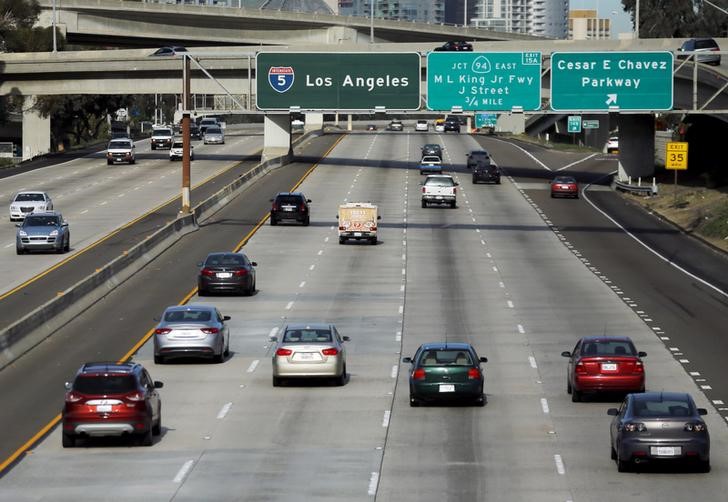By David Shepardson and Nick Carey
WASHINGTON/DETROIT (Reuters) – The fuel economy of new U.S. cars and trucks hit a record 24.7 miles per gallon in the 2016 model year, a government report said, even as some automakers had to buy credits to meet federal requirements.
Fuel economy rose by just 0.1 mile per gallon in 2016 and was projected in the 2017 model year to hit another record of 25.2 mpg, the U.S. Environmental Protection Agency said in a report.
Regulators have been considering whether to revise fuel efficiency requirements. Last March, President Donald Trump ordered a review of tough U.S. vehicle fuel-efficiency standards put in place by the Obama administration, but states like California have pushed back against this decision.
Low oil prices have encouraged Americans to shift away from smaller passenger cars to trucks and SUVs. This has led automakers to worry that rising fuel efficiency requirements through 2025 may be too stringent, but environmentalists say automakers must make vehicles more efficient.
Dan Becker, director of the Safe Climate Campaign, said in a statement that the 2016 fuel economy improvement fell well short of the 1 mile per gallon that the Obama-era rules called for.
The automakers “have the technology to improve mileage,” Becker said. “The standards need to be strengthened, not weakened.”
The report said that after running surpluses in meeting greenhouse gas emission limits, automakers ran a 9 gram per mile deficit. The EPA said all major automakers still comply with the standards, with some using credits banked from prior years to meet the requirements.
Two automakers — Volvo and Jaguar Land Rover — have emission deficits, but they have three years to come into compliance.
A Jaguar Land Rover spokesman said the automaker would work to improve fuel economy and reduce standards through engine downsizing and use of lighter materials.
Fiat Chrysler Automobiles NV had the biggest deficit, falling 28 grams per mile short. But the company had credits banked to meet the requirements.
The company purchased nearly 2.5 million megagrams of emissions credits in 2016 from Tesla Inc, the EPA said. A megagram is equal to 1,000 kilograms and is calculated on emissions saved over legal requirements.
The government does not disclose how much automakers pay for credits. Since 2010, Fiat Chrysler has purchased 22 million megagrams of credits from other automakers, including nearly 6 million from Tesla.
Mazda Motor Corp led the industry in average fuel economy at 29.6 mpg in 2016, but Honda Motor Co is projected to surpass Mazda as the leader in 2017.
“We are confident that our future engineering developments on internal combustion engines… will reinforce our leadership position as the fuel economy champion,” Mazda said in a statement.
Hyundai Motor Co <005380.KS> came second overall for both 2016 and 2017 and said its performance provides “consumers with confidence that the industry can achieve fuel efficiency gains without compromising vehicle appeal, value, customer satisfaction or performance.”
Detroit’s Big Three automakers — including General Motors Co and Ford Motor Co — had the least fuel-efficient fleets overall. They sell a larger share than their foreign rivals do of pickup trucks and SUVs, which generate much larger profit margins than passenger cars.
A GM spokesman said that despite the market shift away from passenger cars, the company’s fuel economy was improving, in part because of rising miles per gallon among trucks and SUVs, coupled with sales of electric vehicles.
According to the EPA, GM’s fuel economy rose to 23 miles per gallon in 2017, from 22.4 miles in 2016 and 22.2 in 2015.
Fiat Chrysler technically had the worst record, but the EPA said data for that automaker and Volkswagen AG The U.S. government filed a civil lawsuit last May accusing Fiat Chrysler Automobiles NV of illegally using software to bypass emission controls in 104,000 diesel vehicles sold since 2014.
VW has struggled to draw a line under its diesel emissions test cheating scandal, which broke in the United States in 2015 and which has cost the automaker as much as $30 billion.
The EPA report measures real world fuel economy, which is less than the values listed on new vehicle window stickers.
(Editing by David Gregorio and Lisa Shumaker)

















